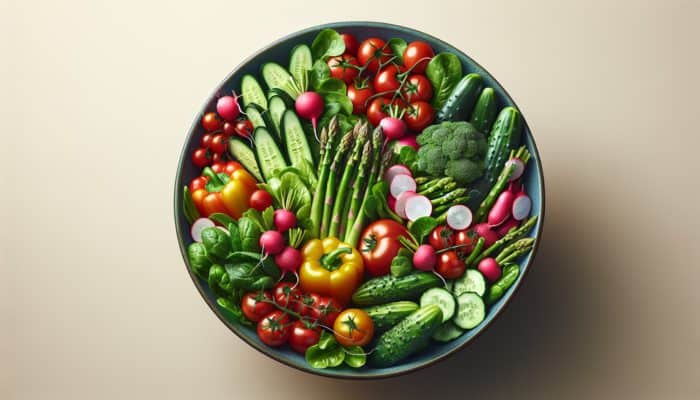Discover a Wide Range of Leafy Greens to Enhance Your Salads
Uncover the Distinctive Traits of Various Lettuce Varieties

When it comes to creating a salad that truly satisfies, lettuce acts as the essential foundation, with each type adding its unique flair to your culinary masterpiece. Consider including Romaine for an irresistible crunch, or opt for arugula, which introduces a delightful peppery zing. Spinach is celebrated as a nutritional powerhouse, overflowing with iron and vital vitamins, while butter lettuce boasts tender leaves that cradle other ingredients, providing a warm and inviting embrace. As you explore these greens, imagine the diverse array of textures and flavors they can create in harmony. A mix of crunchy romaine and zesty arugula has the power to transform a simple salad into a thrilling culinary adventure, while the earthy notes of spinach serve as a balanced backdrop for more intense flavors.
Combining an assortment of greens not only enhances the taste profile but also significantly amplifies the overall nutritional value of your salad. Visualize a vibrant salad base of romaine, layered with zesty arugula and soft spinach leaves. You’re not just enjoying a salad; you’re indulging in a colorful medley of flavors and textures that nourish your body and delight your palate, transforming each bite into a wholesome and enriching experience.
Craft Exciting Salads with a Variety of Leafy Greens
The secret to designing a captivating salad lies in the variety of greens you select. Blending different leafy greens creates a tantalizing flavor fusion that keeps your taste buds engaged and continually discovering new sensations. Why restrict yourself to a single type of green when you can curate a salad that delights both your palate and your eyes? Each green has its own unique nutrient profile; for example, arugula is rich in vitamins A and K, while kale stands out as a premier source of antioxidants. By mixing greens, you’re providing your body with a diverse range of nutrients that work synergistically, transforming every mouthful into a feast for the eyes and a boon for your health.
Imagine your salad bowl overflowing with a striking assortment of greens: the dark, curly leaves of kale intertwined with the crisp texture of romaine, accented by the delicate leaves of butter lettuce. The visual appeal alone invites you to dig in, but it’s the rich array of flavors that keeps you returning for more. When selecting a dressing, consider how these complementary greens will enhance one another. A zesty vinaigrette can brighten the robust flavor of kale, while a creamier dressing pairs beautifully with the lightness of arugula, ensuring a well-rounded and delightful salad experience.
Perfect the Technique of Preparing Leafy Greens
While washing and drying your greens may seem like a mundane task, it is a vital step in crafting a salad that truly shines. Start by rinsing your greens under cool, running water to eliminate any dirt and potential pesticides. For leafy greens, a gentle swish in a bowl of water can effectively dislodge any hidden grit. The objective is to ensure that every crisp bite is as fresh and clean as possible. After washing, it’s crucial to dry your greens thoroughly. A salad spinner is an invaluable tool in this process, effectively removing excess water and preventing your salad from becoming a soggy mess. Nobody desires a salad that resembles a wet dishcloth!
Once your greens are prepped, take a moment to consider their presentation. A vibrant green base sets the tone for the colorful vegetables and toppings you will add next. Layering is key—begin with your greens, then build upwards, creating visual height and interest. As you craft this leafy foundation, remember that the crispness and cleanliness of your greens are essential for that first satisfying bite. The crunch of the lettuce should be gratifying, providing a delightful contrast against the softer textures of the vegetables and proteins you’ll be incorporating next.
Incorporate a Rainbow of Colorful Vegetables

Transform Your Salad with Nutrient-Dense Root Vegetables
Root vegetables are the unsung heroes of the salad realm, offering a vibrant array of colors, crunch, and significant nutritional benefits. Varieties such as carrots, beets, and radishes not only enhance the visual appeal of your salad but also introduce a wealth of essential vitamins and minerals. Carrots add a natural sweetness, while beets deliver a rich, earthy flavor and a striking color that immediately captivates the eye. Radishes provide spicy little bursts that keep the excitement alive within your dish.
When preparing root vegetables, consider their texture and how they will complement your greens. Shredded carrots can create a lovely contrast to the crispness of romaine, while thinly sliced beets can artistically crown a bed of arugula. Don't hesitate to experiment with roasting or pickling these vegetables for enhanced flavor profiles—roasted beets develop a caramelized sweetness that can elevate a simple salad to gourmet levels, while pickled radishes add a tangy bite that invigorates the palate and enriches the overall taste experience.
Incorporating colorful root vegetables ensures that your salad transcends being merely a side dish; it transforms into a visual feast. Picture a bowl brimming with bright orange carrots, deep purple beets, and striking pink radishes, all nestled among a backdrop of vibrant greens. This enticing presentation not only looks fantastic but also guarantees a wide spectrum of nutrients, turning your salad into a wholesome meal that nourishes both body and spirit.
Elevate Your Salad with Leafy Vegetables
Leafy vegetables, including kale, Swiss chard, and cabbage, are essential components in crafting a nutrient-dense salad that benefits both your body and your taste buds. Kale, celebrated for its robust texture and earthy flavor, is a true powerhouse of vitamins A, C, and K, making it a staple in health-conscious kitchens worldwide. Swiss chard boasts vibrant hues—envision deep greens interlaced with bright reds and yellows—that elevate any dish both visually and nutritionally. Cabbage, whether green, red, or savoy, contributes a satisfying crunch and a hint of sweetness that complements a variety of flavors beautifully.
Think about how these leafy vegetables will interact with the other ingredients in your salad. Pairing kale with a citrus dressing brightens its bold flavor, while Swiss chard can be lightly sautéed to enhance its natural sweetness before being tossed into your salad, adding a warm and comforting twist. Cabbage can be finely shredded and massaged with salt to soften its texture, transforming it into a delightful base for heartier salads that satisfy your cravings.
The beauty of incorporating more leafy vegetables lies in their remarkable versatility. They shine year-round, seamlessly adapting to seasonal ingredients. From refreshing summer salads featuring fresh Swiss chard and juicy peaches to hearty winter bowls packed with nutrient-rich kale and roasted squash, the possibilities are boundless and delicious, ensuring you never get bored of your salad creations.
Embrace the Advantages of Seasonal Produce

Utilizing seasonal produce is a game-changing strategy in the salad arena. Not only does it guarantee freshness and enhanced flavor, but it also supports local farmers and helps reduce your carbon footprint. Each season presents a unique bounty, so let's explore how to adapt your salads throughout the year. In spring, embrace tender greens and bright herbs, adding radishes and asparagus for a fresh, zesty touch. Summer is prime time for tomatoes, cucumbers, and bell peppers—each bursting with juicy sweetness and vibrant colors that epitomize sunshine.
As autumn rolls in, hearty vegetables like squash and sweet potatoes can be roasted to perfection, adding a warm, comforting element to your salads. In winter, don’t shy away from using root veggies; think carrots, parsnips, and turnips, which can withstand colder weather while still providing excellent flavor and nutrition.
Incorporating seasonal produce not only enhances the taste of your salad but also encourages culinary creativity and innovation. Experiment with flavors that resonate with the seasons—imagine a summer salad drizzled with a light vinaigrette made from fresh herbs or a winter bowl topped with nuts and warm roasted vegetables that offer both comfort and satisfaction.
Enhance Your Salad with Protein Sources
Delicious Meat Selections for a Filling Salad
Integrating protein into your salad elevates it from a light side dish to a hearty meal that keeps you feeling satisfied and energized. Popular choices like chicken, beef, and turkey can be seasoned and cooked to perfection, providing that wholesome element we often crave. Grilled chicken introduces a smoky depth, while roasted turkey adds a festive flair to your winter salads, making them feel special and indulgent.
When using meat, consider marinating it with aromatic herbs and spices to elevate the flavor profile. A citrus marinade not only enhances tenderness but also beautifully complements the freshness of your greens and vegetables. Slicing the protein thinly allows for seamless incorporation into the salad, ensuring that every bite is a harmonious blend of greens and toppings that satisfies your cravings.
Moreover, think globally—how can you infuse diverse meat preparations from around the world into your salads? A Middle Eastern-inspired salad featuring spiced beef or a Southeast Asian chicken salad with lemongrass and mint can invigorate your culinary repertoire, deepening your appreciation for international flavors and creating exciting new meals that transport your taste buds on a global journey.
Delightful Seafood Options to Elevate Your Salads
Seafood adds a delightful twist to salads, introducing lightness and complexity that can transform your dish into something truly special. Options such as shrimp, salmon, and tuna provide a range of flavors and textures that enhance your salad experience. Grilled shrimp, marinated in garlic and lime, delivers a zesty punch. At the same time, seared salmon offers a rich, flaky texture that pairs wonderfully with robust greens like kale, creating a satisfying and nutritious meal.
When preparing seafood, consider how to maximize its impact. A classic Caesar salad topped with grilled shrimp can be revitalized with a squeeze of fresh lemon and a sprinkle of herbs. In contrast, a tuna salad featuring mixed greens can benefit from a tangy dressing that cuts through the richness of the fish, creating a delightful balance of flavors that excites the palate.
Explore the world of seafood by incorporating flavors from various cuisines. Picture a Japanese-inspired salad layered with sashimi-grade tuna, seaweed, and a soy-based dressing, or a Mediterranean creation featuring grilled octopus, olives, and feta cheese. The versatility of seafood allows for a fun, global salad experience that delights the palate and introduces exciting new culinary adventures to your table.
Incorporate Plant-Based Proteins for a Wholesome Salad
Incorporating plant-based proteins into your salads is not just a passing trend; it’s a lifestyle choice that caters to the growing demand for healthy, sustainable eating. Ingredients like tofu, beans, and chickpeas are versatile additions that bring not only protein but also texture and flavor to your dish. Tofu can be marinated and grilled for a satisfying crunch, while beans and chickpeas add bulk and a delightful creaminess, enhancing the overall experience.
The beauty of plant-based proteins lies in their ability to absorb flavors. Marinating tofu in a mixture of soy sauce, ginger, and garlic can elevate it to new heights, transforming it into a star ingredient in your salad. Consider crafting a Mediterranean chickpea salad featuring fresh herbs, tomatoes, and cucumber, all drizzled with a zesty lemon dressing that amplifies each ingredient’s freshness and taste.
Embrace the power of legumes by introducing lentils, which offer a hearty bite and are packed with essential nutrients. A warm lentil salad with roasted vegetables provides a comforting and nourishing meal during cooler evenings. As the world increasingly shifts towards plant-based diets, the diverse range of options available ensures that your salads remain exciting, flavorful, and satisfying, contributing to a healthy lifestyle.
Incorporate Healthy Fats for Added Richness
Enhance Your Salad with Nuts and Seeds
Adding a sprinkle of nuts and seeds to your salad is akin to applying the final touch to a beautifully crafted masterpiece. Not only do they deliver a satisfying crunch, but they also offer a wealth of nutrients and healthy fats that are essential for a balanced diet. Nuts such as almonds, walnuts, and sunflower seeds are excellent sources of vitamins, minerals, and fiber, enriching your salad experience.
Think beyond just texture; nuts and seeds can also enhance flavor. Toasted almonds introduce a rich, nutty aroma that elevates the overall taste of your salad, while chia seeds provide a subtle crunch and are loaded with omega-3 fatty acids. Experiment with different varieties, such as sesame seeds for an Asian-inspired salad or pine nuts for a Mediterranean flair, ensuring your salads are both delightful to eat and nutrition-packed.
Incorporating these power-packed toppings not only enriches your salad but also guarantees a fulfilling meal that nourishes your body. Picture a crunchy kale salad adorned with toasted walnuts and a drizzle of balsamic glaze—achieving the perfect balance of flavors and textures that will leave your taste buds dancing with joy.
Experience the Creamy Delight of Avocado
No discussion about healthy fats is complete without highlighting the glorious avocado. This creamy fruit is transformative, adding richness and a silky texture that harmonizes beautifully with the crispness of salad greens. Packed with monounsaturated fats, avocados nourish your body while creating a blissful eating experience with each bite.
Slice or dice your avocado just before serving to maintain its vibrant green hue. Pairing avocado with citrus dressing can elevate the overall profile of the salad, as the acidity beautifully balances the creaminess. Imagine a southwest-inspired salad featuring black beans, corn, and diced avocado, all dressed with lime vinaigrette—this combination not only satisfies your palate but also provides a nutritious meal that feels indulgent yet wholesome.
The versatility of avocado means it can be seamlessly integrated into virtually any salad. From a classic Cobb salad adorned with bits of bacon and bleu cheese to an Asian-inspired creation featuring sesame dressing and crunchy vegetables, the options are limitless. Embrace this powerhouse fruit to craft salads that not only please the palate but also deliver a substantial nutrient boost, making every meal a delightful experience.
Utilize Olive Oil for Rich Flavor
When it comes to dressings, olive oil reigns supreme as a simple yet powerful ingredient. Drizzling high-quality extra-virgin olive oil over your salad not only enhances the flavor but also introduces antioxidants and healthy fats that support heart health. The rich, fruity notes of quality olive oil can transform a basic salad into an exquisite culinary experience that tantalizes the senses.
Use olive oil as the foundational base for your dressings, combining it with vinegar, herbs, and spices to create an easy yet delicious dressing. Consider a classic Mediterranean dressing featuring olive oil, balsamic vinegar, and fresh herbs that accentuates the vibrant flavors of your vegetables and greens.
The key to maximizing the benefits of olive oil lies in its quality—look for cold-pressed or organic options to ensure you’re reaping the most nutrients. The ideal olive oil should be fragrant and luscious, enhancing every ingredient in your salad. A drizzle of this golden elixir can elevate a simple mix of greens into a dining experience that transports you to sun-drenched Mediterranean landscapes with every bite.
Enhance Your Salad with Fatty Fish
Incorporating fatty fish into your salads is akin to adding a silver lining to your meal, as it amplifies your intake of omega-3 fatty acids, which are essential for heart and brain health. Options like salmon and sardines bring unique flavor profiles to the table—salmon is rich and buttery, while sardines offer a distinct, briny taste that can elevate your salad to gourmet levels.
Grilled salmon can take center stage in your salad, paired with fresh greens, seasonal vegetables, and a zesty dressing that ties everything together beautifully. Picture a salad topped with flaked sardines, mixed with olives, capers, and a lemon vinaigrette—each bite becomes a delightful experience that transports you straight to the coast.
Fatty fish not only enriches flavor but also provides essential nutrients that support overall well-being. Whether you opt for a classic Nicoise salad or a creative bowl featuring grilled salmon and roasted vegetables, the inclusion of these fish adds depth and richness that transforms the ordinary into the extraordinary, ensuring a fulfilling meal every time.
Incorporate Coconut for a Tropical Twist
Coconut is not merely a tropical indulgence; it’s a versatile ingredient that can infuse your salads with unique flavor and healthy fats. Using coconut oil or shredded coconut introduces a natural sweetness that beautifully balances the earthiness of your greens and vegetables. Consider utilizing coconut oil as a base for your salad dressing, blending it with citrus juice and herbs for an enticing tropical twist.
Shredded coconut can be sprinkled over your salad for added texture and a subtle sweetness that complements the freshness of your ingredients. Imagine a tropical salad bursting with mango, avocado, and shredded coconut, all dressed in a light, tangy lime vinaigrette—this vibrant dish transports you to a sun-soaked paradise with every mouthful.
Embracing coconut in various forms—be it oil, flakes, or even milk—allows for creativity in your salad preparations. As you explore flavors from different cultures, consider a Thai-inspired salad featuring coconut, lime, and fresh herbs, crafting a harmonious blend that tantalizes your taste buds and nourishes your body.
Elevate Your Salad with the Freshness of Fruits
Brighten Your Salad with Citrus Fruits
Citrus fruits are nature’s zest bombs, infusing freshness and a zingy brightness into your salads. Slices of orange or grapefruit can instantly transform a lacklustre bowl of greens into a vibrant symphony of flavors that awaken the senses. The acidity of citrus not only elevates the overall taste but also complements the creaminess of ingredients like avocado or cheese, adding a refreshing twist that invigorates every bite.
Incorporating citrus into your salad is a breeze—consider a citrus and fennel salad where thinly sliced oranges and grapefruits are paired with crunchy fennel, creating a refreshing contrast. The bright colors alone make it a feast for the eyes, while the unique flavors dance on your palate, offering a harmonious balance of tastes that is both uplifting and satisfying.
Experiment with various citrus fruits and their zest to create unique dressings or marinades. A simple vinaigrette with lemon juice, olive oil, and zest can elevate any salad, while segments of citrus can create delightful surprises in each bite. Allow your creativity to flow as you explore the world of citrus, transforming ordinary salads into extraordinary culinary experiences that excite the palate.
Incorporate Berries for a Sweet and Nutritious Touch
Berries are nature’s candy, bursting with natural sweetness and antioxidants that elevate your salads to new heights. Tossing in strawberries, blueberries, or raspberries not only adds a touch of sweetness but also contributes vibrant color and flavor. Picture a summer salad featuring mixed greens topped with plump strawberries and a sprinkle of feta—a delightful contrast that dances across your palate, creating a balanced and satisfying dish.
The beauty of berries lies in their versatility. They can be enjoyed fresh, frozen, or even dried, making them an easy addition to your salads year-round. Consider a blueberry and spinach salad drizzled with a honey vinaigrette, where the sweetness of the berries pairs beautifully with the earthy greens, crafting a balanced and nourishing meal that satisfies both hunger and the craving for something delicious.
Not only do berries enhance flavor, but they also provide a wealth of health benefits, including vitamins, minerals, and antioxidants that combat oxidative stress. Embrace the burst of flavor that berries bring to your salads, transforming them into vibrant and nutritious meals that fulfill both your appetite and your desire for deliciousness.
Make Your Salad Interesting with Dried Fruits
Dried fruits are the unsung heroes of the salad world, contributing a chewy sweetness that contrasts beautifully with the crunch of greens and vegetables. Options like raisins, cranberries, and apricots can be incorporated into your salads for an unexpected twist that keeps things fresh and exciting. When selecting dried fruits, opt for those without added sugars to ensure you’re nourishing your body without unnecessary additives.
Imagine a spinach salad topped with tangy dried cranberries, toasted pecans, and a zesty dressing—each bite offers a delightful interplay of textures and flavors that keeps you engaged. Dried fruits can also serve as a natural sweetener in dressings, infusing your salad with a hint of sweetness that beautifully balances other savory components, creating a harmonious flavor experience.
Getting creative with dried fruits allows you to explore diverse flavor profiles. Consider adding dried figs to an earthy kale salad, pairing their sweetness with rich goat cheese for a gourmet experience. The inclusion of dried fruits not only enhances taste but also adds fiber and essential nutrients, ensuring your salad is a powerhouse of nutrition and flavor.
Awaken Your Salad with Tropical Fruits
Tropical fruits can take your salad on a global adventure, infusing it with exotic flavors and vibrant colors. Incorporating mango, pineapple, or kiwi introduces a sweet and juicy element that significantly elevates your salad game. The bright hues of these fruits can transform a standard bowl of greens into a culinary masterpiece, transporting you to sun-kissed shores with every bite.
Consider crafting a tropical salad featuring mango and avocado, drizzled with a light lime vinaigrette. The sweetness of the mango pairs perfectly with the creaminess of the avocado, creating a refreshing contrast that is simply irresistible. The key to incorporating tropical fruits is achieving a balance of flavors—adding a hint of spice, such as jalapeño or a sprinkle of chili powder, can create a delightful punch that invigorates your dish and excites the palate.
These fruits also provide a bounty of vitamins and minerals, making them not only delicious but also nourishing. Whether you’re assembling a vibrant summer salad or a warming winter bowl, tropical fruits can add an exotic twist that excites the palate and keeps your salads fresh and engaging throughout the year.
Create Flavorful Dressings for Your Salad
Master the Essentials of Vinaigrettes
A great salad dressing is the unsung hero of the culinary world, possessing the power to elevate even the most mundane ingredients into a delightful dish. The classic vinaigrette is a simple yet versatile option, combining oil, vinegar, and seasonings for an explosion of flavor. The basic ratio of three parts oil to one part vinegar sets the stage; however, don’t hesitate to experiment with different types of oils and vinegars to discover your ideal blend.
Consider using high-quality extra virgin olive oil for its rich flavor and numerous health benefits. Balsamic, red wine, or apple cider vinegar each brings unique notes that can transform the profile of your salad. A pinch of salt and pepper completes the base, but feel free to experiment with additional ingredients like mustard, honey, or garlic to create depth and complexity that tantalizes your taste buds.
The beauty of vinaigrettes lies in their adaptability. Create a zesty lemon vinaigrette for bright summer salads or a rich balsamic vinaigrette for heartier winter greens. Remember to whisk or shake your ingredients vigorously to create an emulsion, ensuring that each drizzle is a perfect blend of flavors that envelops your salad beautifully and enhances every bite.
Indulge in Creamy Dressings for a Luxurious Experience
If you’re craving something richer, creamy dressings provide a luxurious mouthfeel that can elevate your salad experience to new heights. Blending yogurt, mayonnaise, or avocado creates a smooth and indulgent dressing that complements salads beautifully. Greek yogurt serves as an excellent base, offering a thick texture and a punch of protein that’s both satisfying and healthy.
Consider crafting a creamy avocado dressing that combines ripe avocado with lime juice, garlic, and a splash of water for a luscious dressing that pairs wonderfully with mixed greens. Alternatively, a classic ranch dressing made with buttermilk and fresh herbs can bring comforting vibes to your salad, transforming it into a delightful meal that satisfies your cravings with every bite.
Creamy dressings can also accommodate a range of flavors—from spicy to sweet—making them incredibly versatile. Consider incorporating ingredients like sriracha for a spicy kick or honey for a touch of sweetness. The key is balance; the creaminess should enhance—not overpower—the fresh ingredients in your salad, ensuring a harmonious dining experience that leaves you feeling satisfied.
Infuse Your Dressings with Fresh Herbs
Fresh herbs are nature’s flavor enhancers, transforming any dressing into a vibrant concoction bursting with life. Adding herbs like basil, cilantro, or dill to your dressings can create an explosion of flavor that perfectly complements your salad. The freshness of herbs not only brightens the dressing but also ties together the various elements of your salad, creating a cohesive and delightful experience that excites the palate.
Consider a simple vinaigrette enhanced with fresh basil for a refreshing twist. Blending herbs into your dressing creates a delightful fragrance that lingers, enhancing the overall experience. A cilantro-lime dressing can add a zesty punch to a taco-inspired salad, while dill brings a comforting touch to a classic potato salad with a creamy dressing that delights the senses.
Using herbs doesn’t have to stop at dressings—consider sprinkling fresh herbs over your salad as a final touch. A sprinkle of chopped parsley or chives can elevate the presentation while adding a burst of freshness that enhances every bite. Embrace the world of herbs and let them be your secret weapon in crafting salads that not only taste incredible but also look visually stunning and appetizing.
Add Crunchy Elements for Texture
Enhance Your Salad with Croutons
Croutons are the cherry on top of your salad sundae, providing that satisfying crunch that transforms a dish from good to glorious. Whether homemade or store-bought, these crispy morsels can complement a variety of salads. Making your croutons is simple: toss cubed bread with olive oil, salt, and your favorite spices, then bake until golden and crunchy, creating the perfect topping.
The beauty of croutons lies in their ability to absorb the flavors of your dressing while maintaining their crunch. Imagine a Caesar salad topped with garlic croutons, where each bite offers a perfect balance of crunchy and creamy textures that elevate the entire dish. Consider experimenting with different types of bread—sourdough, whole grain, or even gluten-free options—to create unique textures and flavors that keep your salads exciting and fresh.
Not only do croutons enhance texture, but they also add a satisfying element that changes the entire eating experience. As your teeth sink into these crunchy bites, they awaken your taste buds, making the salad more enjoyable. They’re not just a topping; they’re an essential component of a well-rounded salad that keeps you coming back for more.
Introduce Tortilla Strips for a Fun Crunch
For a lighter yet crunchy addition, tortilla strips are a fantastic option that brings a delightful texture to your salad. These crispy strips can provide a fun twist, making your salad feel more like a fiesta. Whether you bake or fry them, tortilla strips add a satisfying crunch that beautifully complements fresh ingredients, turning an ordinary salad into an exciting culinary experience.
Consider using baked tortilla strips for a healthier alternative, tossing them with a sprinkle of salt and your favorite spices before baking. Adding these to a southwestern salad featuring black beans, corn, and avocado creates an exciting mix of flavors that’s irresistibly good. The crunch of the tortilla strips contrasts beautifully with the creaminess of the avocado and the freshness of the greens, making each bite a new and delightful experience.
Tortilla strips can also be creatively incorporated; think about adding them to a refreshing fruit salad for a surprising twist, where the crunch enhances the sweetness of the fruit. Embrace the versatility of tortilla strips and let them add a unique element to your salads, ensuring a delightful crunch with every bite.
Elevate Your Salad with Toasted Breadcrumbs
Toasted breadcrumbs are a subtle yet powerful addition that can significantly elevate your salad game. These crunchy morsels are an easy way to add texture and flavor, transforming your dish into a gourmet experience. Think of breadcrumbs as the seasoning for your salad, providing that finishing touch that ties all the elements together beautifully.
Toasting your breadcrumbs with a bit of olive oil, garlic powder, and herbs creates a delightful topping that adds a burst of flavor. Picture a warm spinach salad topped with golden, crispy breadcrumbs—each bite offers a delightful crunch that contrasts beautifully with the tender greens. The toasted breadcrumbs soak up the dressing, enhancing the overall experience and creating a harmonious balance of textures and flavors that will leave you craving more.
Experimenting with different types of breadcrumbs—such as panko for extra crunch or whole grain for a nutty flavor—can further enrich your salads. Don’t hesitate to think outside the box; consider adding toasted breadcrumbs to a classic pasta salad for a surprising twist or a fresh herb salad for an extra layer of flavor. In the world of salads, toasted breadcrumbs are a simple yet impactful way to enhance your dish and make it truly memorable.
Finish Your Salad with Fresh Herbs
Elevate Your Salad with Parsley and Cilantro
Fresh herbs can serve as the final flourish that elevates your salad from ordinary to extraordinary. Chopped parsley and cilantro bring a burst of freshness that enhances the overall flavor profile. Parsley offers a mild, slightly peppery taste that brightens up nearly any salad, while cilantro adds a unique, zesty note that pairs beautifully with a variety of ingredients, particularly in Mexican and Southeast Asian cuisines.
When using parsley, consider finely chopping it to release its aromatic oils, allowing it to infuse your salad with flavor and vibrancy. A sprinkle of parsley can elevate a classic Greek salad, where its bright green hue beautifully contrasts with the tomatoes and olives. Cilantro, on the other hand, shines in more adventurous salads, adding an unexpected layer of flavor that transports your taste buds to vibrant culinary landscapes.
Don’t shy away from mixing and matching your herbs for a more complex flavor experience. A sprinkle of both parsley and cilantro can create a delightful interplay of tastes, enhancing even the simplest of salads into a culinary delight. Fresh herbs not only enhance taste but also contribute beautiful colors and aromas, making your salads a feast for the senses that you’ll want to share with everyone.
Incorporate Basil and Mint for an Aromatic Touch
Basil and mint are aromatic herbs that can add a delightful touch to your salads, each bringing its unique characteristics and benefits. Basil, with its sweet, peppery flavor, is a classic choice for Mediterranean salads. Imagine a caprese salad featuring juicy tomatoes and creamy mozzarella, all elevated by the aromatic notes of fresh basil—truly, it’s summer on a plate!
Mint introduces a refreshing zing that can brighten up any dish. Pairing mint with fruits like watermelon or strawberries creates a refreshing summer salad that’s incredibly satisfying. You can also find mint in Middle Eastern salads, where it complements the flavors of yogurt and cucumber beautifully, creating a refreshing contrast that awakens the palate.
Using these herbs fresh ensures that their flavors remain vibrant and impactful. Tear or chiffonade the leaves to release their oils, and add them just before serving for maximum taste. Experiment with blending basil and mint in dressings to create a unique flavor profile that excites the palate. Adding these herbs not only enhances flavor but also provides visual appeal, turning your salads into vibrant, flavor-packed masterpieces.
Frequently Asked Questions about Salad Preparation
What are the best greens for a salad?
Romaine, arugula, spinach, and kale are excellent choices. A mix of different greens enhances both texture and flavor, creating a delightful salad experience that captivates the senses.
How can I make my salad more nutritious?
Incorporate a variety of colorful vegetables, lean proteins, healthy fats, and whole grains to boost the nutritional profile of your salads significantly, ensuring a well-rounded meal.
What types of protein can I add to my salad?
Options such as chicken, beef, turkey, shrimp, salmon, and plant-based proteins like tofu, beans, or chickpeas are all great additions to enhance your salad and make it more filling.
How do I make a simple vinaigrette?
Combine three parts oil with one part vinegar. Whisk in salt, pepper, and any additional flavorings, such as mustard or herbs, to create a delicious dressing for your salad.
Can I prepare salad dressings in advance?
Yes, many dressings can be prepared ahead of time and stored in the fridge for several days. Just shake or stir before using to ensure even distribution of flavors that enhance your salad.
What fruits pair well with salads?
Berries, citrus fruits, apples, and dried fruits like cranberries or raisins add sweetness and colorful contrast to your salads, enhancing both flavor and visual appeal.
How do I keep my salad fresh for longer?
Store greens separately from dressings and toppings. Wash and dry greens thoroughly before storing in a container with a paper towel to absorb moisture and maintain crispness.
Are croutons necessary for a salad?
While not essential, croutons add a satisfying crunch. Alternatively, you can use nuts, seeds, or crispy tortilla strips to achieve a similar crunchy effect that enhances your salad experience.
Why should I add healthy fats to my salad?
Healthy fats from sources like avocado, nuts, and olive oil enhance flavor and aid in the absorption of vitamins from other ingredients, making your salad more nutritious and delicious.
How can I make my salad more filling?
Incorporate proteins, whole grains, and hearty vegetables to create a more substantial meal that keeps you feeling satisfied for longer periods, ensuring a fulfilling dining experience.
Connect with us on Facebook!
The post How to Make a Salad That Tastes Good: Fresh and Flavorful appeared first on https://cookinggods.com





Comments are closed